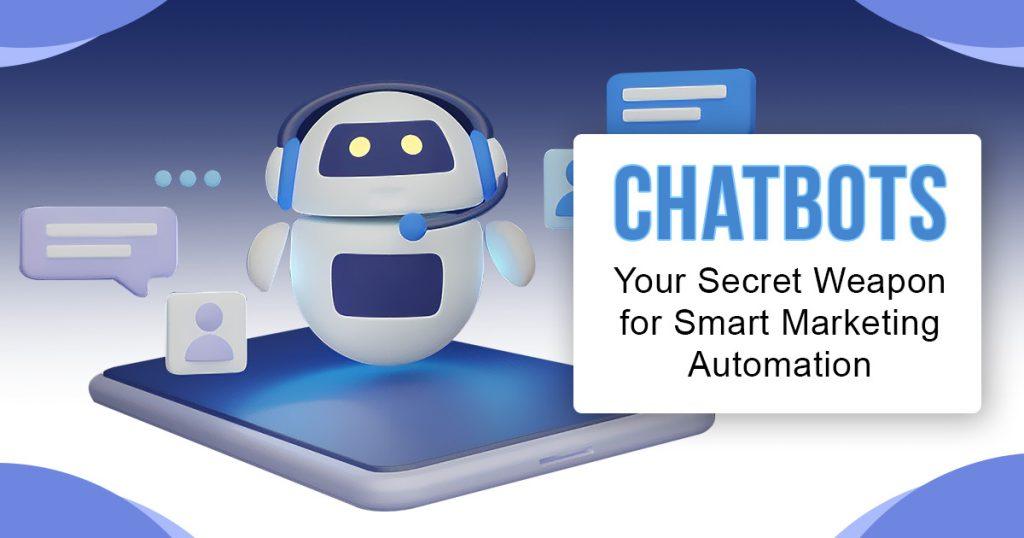Artificial Intelligence (AI) has quickly changed the way marketing works, offering new capabilities that seemed impossible not long ago. By automating various tasks, AI is making the industry more efficient, personalizing customer interactions, and helping marketers make better decisions based on data. This allows marketers to spend more time on strategic work while AI takes care of repetitive and time-consuming tasks.
According to a Gartner study, by 2025, AI will handle 80% of all customer interactions. This shows how much businesses are relying on AI to improve the customer experience and streamline marketing processes. Among these AI tools, chatbots stand out as essential, playing a big role in automating customer service, generating leads, and providing personalized communication.
What Are AI Chatbots?
AI chatbots are smart virtual helpers that talk to people like a human would. They work through messaging apps, websites, and mobile apps. These chatbots use technology to understand what you’re saying and reply with helpful answers.
How Do They Work?
- Understanding You: When you type or speak to a chatbot, it sends your message to a server.
- Processing: The server uses special programs to figure out what you mean by looking at your words.
- Replying: Based on what it understands, the chatbot sends back an appropriate response.
Some prominent examples of AI chatbots include:
- IBM Watson: Used in many areas for customer service and support.
- Amazon Alexa: A voice assistant that helps with shopping and controlling smart home devices.
- Google Assistant: Helps with tasks like setting reminders and finding information online.
The Importance of Chatbots in Marketing Automation
Chatbots are really important for making marketing easier and more effective. Here are some key ways they can help:
1. 24/7 Customer Support
Chatbots are always available, answering customer questions any time of day or night. This means customers get help whenever they need it, which keeps them happy.
2. Engaging Customers
Chatbots talk to customers in real-time, providing instant answers to their questions. This quick interaction keeps customers engaged and makes them feel important.
3. Personalized Engagement
By looking at what users do, chatbots can suggest things they might like, making the experience more personal. They deliver recommendations and messages tailored to each customer’s preferences.
4. Efficiency
Chatbots handle routine tasks like answering frequently asked questions, scheduling appointments, managing orders, and tracking FAQs. This frees up human staff to work on more important and complex tasks, improving overall efficiency.
5. Lead Generation and Qualification
Chatbots chat with website visitors in real-time, gathering information, qualifying leads, and directing them to the right sales channels. This helps turn visitors into potential customers more effectively.
6. Data Collection and Insights
Every conversation with a chatbot provides valuable data about customer preferences and behavior. This data helps businesses improve their marketing strategies and understand what customers want.
Leveraging Chatbots for Marketing Automation: How to Use It?
Using chatbots in your marketing strategy can bring many benefits. Here’s how businesses can make the most of chatbots for marketing automation and why it’s a good idea:
1. Customer Support
Place chatbots on your website or app to answer common questions, solve simple problems, and provide information about your products or services. This way, customers get quick help and have a better experience.
2. Personalized Marketing
Chatbots can gather data on what customers like and do. Use this information to send personalized messages and offers, increasing the chances of making a sale.
3. Lead Generation
Chatbots can chat with visitors on your website, collect their contact information, and qualify them as leads. By asking the right questions, chatbots can decide which leads are valuable and pass them on to the sales team.
4. Automated Scheduling
Let chatbots handle appointment bookings and reminders. This is especially useful for businesses that rely on scheduling appointments.
5. Content Sharing
Use chatbots to share relevant content with users based on their interests and past interactions. This could be blog posts, newsletters, or product updates, keeping customers engaged.
6. Collecting Feedback
Deploy chatbots to ask for customer feedback after purchases or interactions. This real-time feedback helps you understand customer satisfaction and what needs improvement.
Chatbots for Marketing Automation: Is It Worth It?
Investing in chatbots for marketing automation is generally a wise decision for several reasons:
- Cost Savings: Chatbots can handle routine questions and tasks, reducing the need for large customer support teams and saving money.
- Better Customer Experience: Instant responses and personalized interactions make customers happier and more loyal.
- Higher Conversion Rates: Real-time engagement and personalized recommendations help convert more visitors into customers.
- Scalability: Chatbots can manage many interactions simultaneously, making them ideal for growing businesses that need to scale without incurring huge costs.
- Valuable Insights: Chatbots collect data on customer behavior and preferences, providing deep insights that help refine marketing strategies.
In short, using chatbots for marketing automation is a smart move. They make operations smoother, improve customer engagement, and provide useful insights. The benefits often outweigh the initial setup and maintenance costs, making chatbots a worthwhile investment for most businesses.
